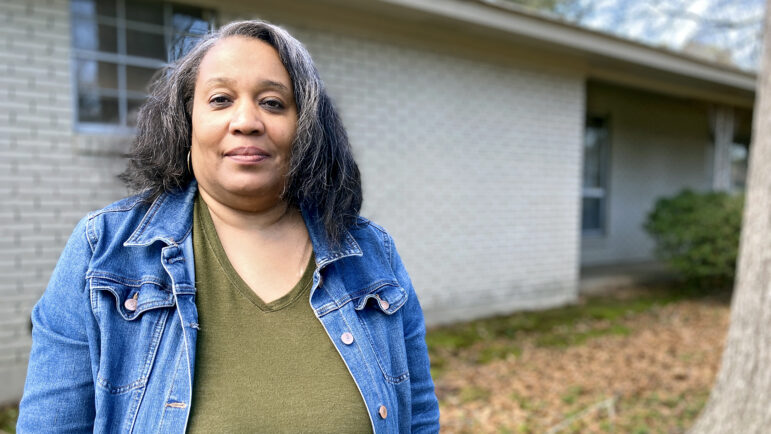How food stamps could play a key role in fixing Jackson’s broken water system
In this file photo, Michelle Hartfield, a public information officer for the Salvation Army, takes notes while Booker Ellis, Chris Bonham and Walter Houston unload water donated by the Salvation Army to the Mississippi Industries for the Blind on Thursday, Sept. 1, 2022.
Jackson, Mississippi, is trying to turn the reputation of its long-troubled water system from a warning to a model by piggybacking off one of the nation’s oldest safety nets: food stamps.
To keep bills affordable while raising rates, the city’s water provider plans to give a discount for customers who receive Supplemental Nutrition Assistance Program (SNAP) benefits, which morphed out of the Food Stamp Program. Water experts praised the solution as a simple way to bring in more revenue for the historically underfunded system, while still helping more customers than traditional discount programs.
Privacy concerns from the U.S. Department of Justice, however, have stalled the plan in court, and some Jackson residents don’t believe it’s fair to only give a discount to SNAP recipients when many other residents still struggle to pay their bills.
‘It’s a very sustainable model’

JXN Water announced at the end of 2023 that water bills would go up about 13% for the average customer, before accounting for taxes and the city’s sanitation charge.
Ted Henifin, the third-party manager assigned by a federal judge to manage the city’s water, said the change will bring in enough revenue to cover the utility’s debts and keep it funded into the future.
“We wouldn’t propose a rate that doesn’t get us financially stable,” Henifin said, adding some hikes might come later in the decade, along with inflation bumps after that. “It’s a very sustainable model.”
SNAP recipients will still pay the higher rate, but they could also receive at least a $30 discount, or more based on the size of their water meter. Many of these customers should see their bills drop by roughly 30%, according to JXN Water.
The utility wants to make the discount automatic, a key part of the plan. The DOJ, however, has refused to provide records of who’s on SNAP to JXN Water, calling it a violation of SNAP recipients’ privacy.
Henifin asked U.S. District Court Judge Henry Wingate to force the DOJ to release those records. Wingate is the same judge who appointed Henifin to fix Jackson’s water issue and has backed and praised Henifin’s work since taking the role.
While this legal battle plays out, residents can call JXN Water to prove they receive SNAP and get their bill reduced.
Keep it simple
While tying a discount to SNAP seems complicated, it’s actually meant to be a simpler solution than what’s offered by other water providers — when and if the discount becomes automatic.
Utilities usually tie their affordability programs to a customer’s income, like Philadelphia and its water bill assistance offering. These programs, however, require customers to verify how much they earn, a process that involves piles of paperwork and can take hours to complete. Only 25% of those eligible for Philadelphia’s discount actually receive it — a high mark compared to other discount programs.
“It’s not because people are evil, or stupid, or trying to hide these programs,” said Manny Teodoro, a professor of public affairs at the University of Wisconsin-Madison. “They want people to get into these programs, but they don’t participate.”
Last year, Teodoro wrote a blog post that inspired JXN Water’s plan, suggesting that a better approach to water discounts would be tying them to social safety net programs. By just copying their rolls, utilities won’t have to build and run a new bureaucracy to verify income, and it saves customers time and paperwork — ideally leading to more people receiving the benefit.
Nationally, more than 80% of people eligible for SNAP receive it — leagues higher than what water providers achieve.
“Just leverage the best program we got,” Teodoro said.
Water experts have praised this approach for its simplicity on both the customers’ and utilities’ side, believing it could be adopted elsewhere.
“From an economics perspective, I actually like this a lot,” Ahmed Rachid El-Khattabi, the associate director for Research and Data at the Environmental Finance Center at the University of North Carolina at Chapel Hill. “I’d love to see the result of some sort of analysis that comes out of this, but I can definitely see this taking off.”
El-Khattabi wishes customers were charged differing rates as their water consumption increases to encourage more conservation, but he appreciates that JXN Water’s approach keeps the bills easy to read — a significant benefit as the utility tries to resolve decades of distrust from residents, justified by decades of boil water notices and billing mistakes.
‘I still don’t trust the water’

The new rates and revenue have yet to increase Jacksonians’ faith in the city’s water system.
Residents have rejected the proposed plan on two major points, including tying the water discount to SNAP benefits. In a city where a quarter of residents live below the federal poverty line and SNAP participation is one of the lowest in the nation, the proposed plan leaves out many residents who could use the help.
“I know many families in this city that don’t receive food assistance in any way shape or form,” Brooke Floyd, the co-director of the Jackson People’s Assembly, which surveys Jackson residents about policy issues, said, “but [they] cannot handle high bills or expensive bills.”
Using SNAP as the sole requirement for a discount also leaves out elderly residents on a fixed income who don’t receive that benefit. Many SNAP recipients also live in apartments where they don’t receive a water bill. Instead, their landlord includes the cost in their rent.
Residents also reject the idea that they should front the bill for fixing Jackson’s water system, especially when they still don’t trust the water enough to use it.
JXN Water touts major improvements to the system since the entire city fell under a boil water notice for about six weeks in 2022. But a freeze in January led to more boil water notices, including a city-wide enforcement that lasted for one day. The utility blamed the notice on a misinformation campaign on social media.
“We’re paying for a meter and then we’re paying for the water that we have to use that you cannot drink or cook with,” Catherine Lacy, a lifelong Jackson resident, said. She relies on bottled water for everything but bathing and laundry.
“I still don’t trust the water,” she said.
Some residents believe grants or federal dollars, such as those from the American Rescue Plan, should cover the costs. Jackson has received about $800 million in federal funding to fix the water system and Henifin has tried to use some federal dollars to cover the utility’s debt, but he also wants to implement a funding model that will be sustainable long after the federal money dries up.
Water experts are also not universally on board with JXN Water’s simple approach.
Alexandra Campbell-Ferrari, the Executive Director of the Center for Water Security and Cooperation, said instead of giving everyone who qualifies the same discount, the reduction should be higher for customers who make less — scaling it to each resident’s need. That’s not possible with a flat rate based on SNAP.
“It’s better than nothing, but I do think the impact can be limited,” Campbell-Ferrari said. “Things that are tied closer to your income, your asset levels — things like that — can be more equitable.”
Henifin acknowledges that SNAP isn’t a perfect solution, but he believes relying on it as a proxy for income will still cause the discount to reach, and help, significantly more people than programs from other water providers.
“My argument is there’s no better way,” Henifin said. “The next best thing from our perspective, maybe the only best thing, is the SNAP benefit.”
This story was produced by the Gulf States Newsroom, a collaboration between Mississippi Public Broadcasting, WBHM in Alabama, WWNO and WRKF in Louisiana and NPR.
DHS ends Temporary Protected Status for thousands from Nicaragua and Honduras
Some 76,000 people from Nicaragua and Honduras were covered by TPS, which provides protection from deportation and grants work permits to people from certain nations affected by war or natural disasters.
BRICS nations push back as Trump warns of tariffs
Leaders of the BRICS group of emerging economies meeting for their annual summit had hoped to downplay any differences with the U.S. But even a toned down group proclamation drew the ire of President Trump.
DOJ says no evidence Jeffrey Epstein had a ‘client list’ or blackmailed associates
The two-page memo outlines the "exhaustive review" the department conducted of the Epstein files in its possession, and also reiterates that Epstein died by suicide, contrary to some conspiracy theories.
Floods are getting more dangerous around the country, not just in Texas
The deadly floods in Central Texas were caused by extremely heavy rain. Climate change is causing even more rain to fall during the heaviest storms.
Near old Montana mine, special clinic for asbestos-related illness fights to survive
The Center for Asbestos Related Disease in Libby, Montana, closed in May after a court judgment. The clinic's federal funding is also threatened. Patients with scarred lungs worry about what's next.
4 things to know about the deadly Texas floods and ongoing search efforts
Search efforts continue for the dozens of people still missing after Friday's floods, as questions swirl over what went wrong. Here's what we know so far.






